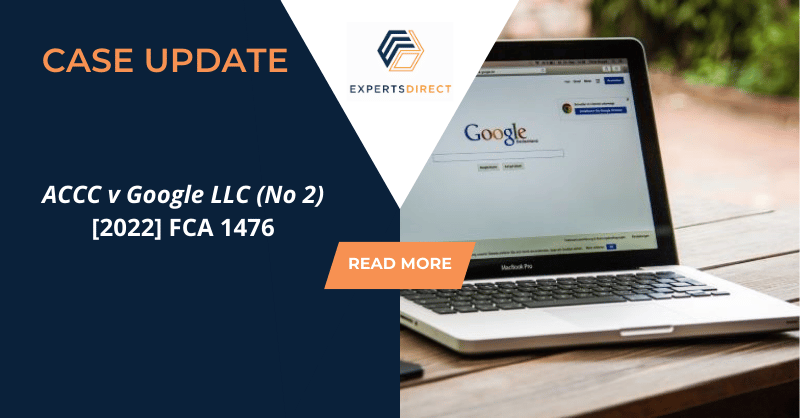In ACCC v Google LLC (No 2) [2022] FCA 1476, the court found the expert evidence presented, comprising two reports from the plaintiff’s expert, one report from the defendant’s expert, and a joint report, to be of very limited assistance despite the time devoted to it at the hearing.
In this case, the ACCC alleged that Google contravened the Australian Consumer Law (ACL) by engaging in conduct that was misleading or deceptive, making false or misleading representations, and engaging in conduct that was liable to mislead the public as to the nature or characteristics of the services it provided.
This stemmed from Google’s global project “Narnia 2.0”, where Google sought the permission of its account holders to make changes to the settings in their Google accounts. In order to obtain permission to make these changes, Google displayed a notification which the ACCC claims to have failed to adequately inform account holders that Google was seeking consent to undertake certain activities, and that Google had made a change to its Privacy Policy.
The ACCC served two reports from A/Prof PLN, a behavioural scientist. Google served a report from Prof L, an economics professor. A/Prof PLN and Prof L subsequently prepared a joint expert report noting the areas on which they agreed and disagreed.
Five business days before the commencement of the final hearing Google, in its written opening submissions, raised what it termed “global” objections to the admissibility of A/Prof PLN’s evidence within the meaning of section 79 of the Evidence Act on the grounds that:
- the opinions were based on her own, non-expert, reading of the Notification;
- A/Prof PLN’s first report was directed, in part, to answering a particular question by reference to principles of which she had no specialized knowledge, and her reports did not refer to those principles.
Google raised further objections including that, should the court be minded to find A/Prof PLN had relevant specialised knowledge, it could not be satisfied that her opinions were based on specialised knowledge given her manner of expression; and that those opinions trespassed beyond matters pleaded by the ACCC.
Interestingly, although Google objected to the evidence of A/Prof PLN on the grounds it was not wholly or substantially based on specialised knowledge, it’s expert had similar expertise, and did not introduce any empirical evidence which would have provided the court with a proper opinion in response.
Yates J noted the oddity of objecting to the admissibility of expert evidence only after the party objecting had substantially engaged with that evidence, both by having served a responding expert report and participating, without objection, in a joint expert conference resulting in the production of a joint report.
In order for the court to rule on the objections raised by Google, it would need an in-depth understanding of all of the expert evidence. Yates J expressed concern that such a significant undertaking would adversely affect the trial schedule, and suggested that all of the expert evidence be admitted, with the parties to address the court on the weight to be given to that evidence in their closing submissions.
Google did not press its objections to the evidence of A/Prof PLN and her reports, and comments in the joint report, were admitted into evidence. The court noted that the success of the objections would not have necessarily led to the rejection of A/Prof PLN’s evidence in its entirety.
Although based on identified principles of behavioural economics, the court found that A/Prof PLN’s opinions in her first report were “hypotheses, conjecture, or predictions”. [231] While her second report, though formulated by applying “key behavioural science principles”, was found to be without reference to data. [231]
Google’s expert, Prof L, opined that the hypotheses formulated by A/Prof PLN would not be accepted or rejected without subsequent testing by empirical analysis, which was not undertaken in this case. Prof L’s criticisms of the evidence of A/Prof PLN were accepted by the court. [233]
The court could not be convinced by hypotheses alone, with Yates J stating:
“Fact-finding, in the context of a case which raises significant questions of legal liability with serious legal consequences (including the imposition of pecuniary penalties), requires a feeling of actual persuasion, on the preponderance of the evidence, that the asserted facts exist or occurred.” [234]
When considering the expert evidence, Yates J noted that whilst it provided some relevant background material, it strayed far from the case that Google was required to meet, which was as stated in the Amended Concise Statement, “not the broader case advanvced in the expert evidence”. [239] Overall, the expert evidence was found to be of little utility.
The court ultimately dismissed ACCC’s originating application, and ordered the Commission to pay Google’s costs.
Key takeaways:
- In this case, both parties essentially put forward the same opinion from experts with similar expertise, unsupported by any empirical data which was of little utility to the court.
- While expert evidence that goes beyond the case as pleaded may be helpful in providing the court with background material, ultimately it should align with the case as pleaded by the parties so it’s useful to the court.
- Objections to expert evidence should be raised in a timely fashion once that evidence has been considered in the context of the case pleaded. Objections to expert evidence made at the time of opening submissions may impact on the trial schedule or result in evidence that might otherwise have been ruled inadmissible had the court considered the objections earlier, being admitted.
- Hypotheses, conjecture, or predictions are not persuasive. Expert opinion must be based on fact-finding, which requires a feeling of actual persuasion that the asserted facts exist or occurred.
Read the full decision here:
